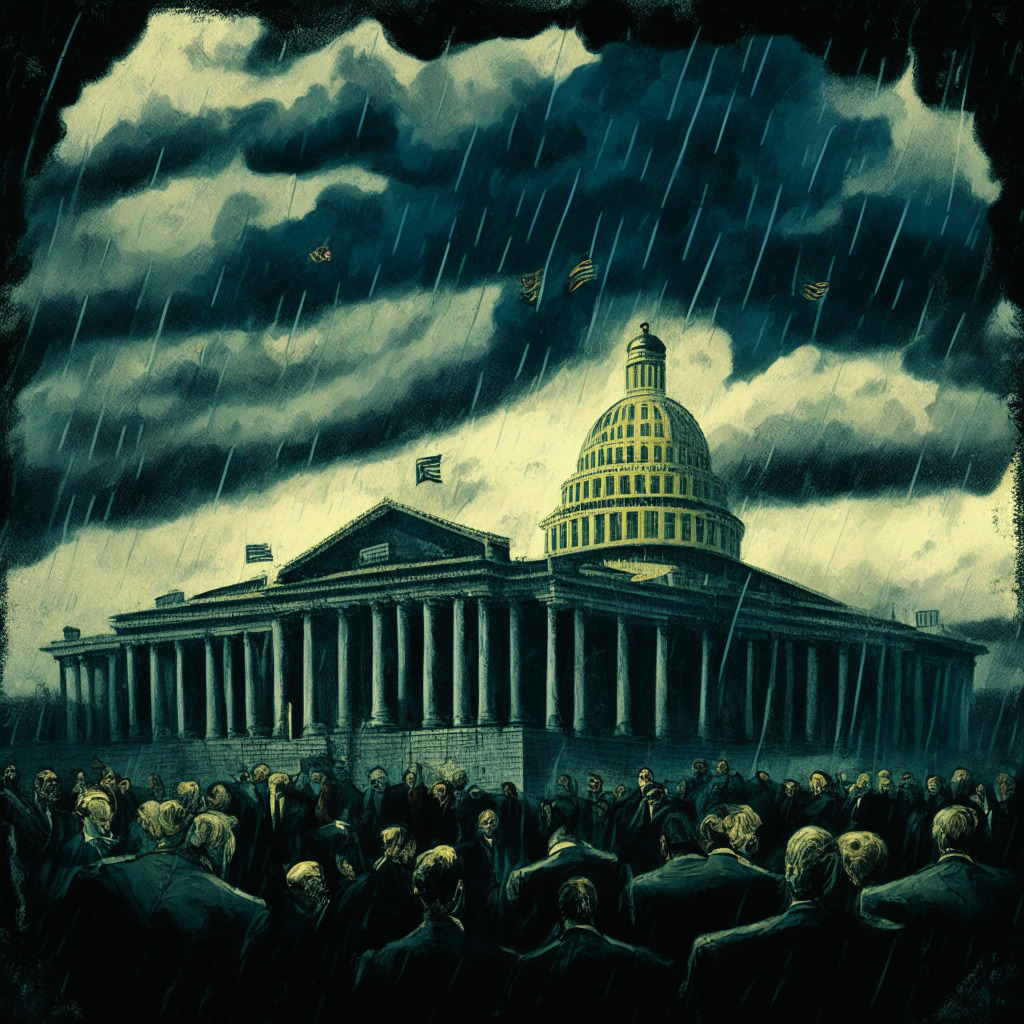Republican lawmakers express concerns over the Federal Reserve’s intensified oversight on crypto and stablecoin activities, arguing it might block the progress of a legislative proposal aimed at regulating stablecoins. Lawmakers believe the increased scrutiny might dissuade financial institutions from entering the digital asset ecosystem.
Search Results for: Republican
Legal Clash in US Crypto Regulations: Republicans and Democrats Weigh In
The House Financial Services Committee advances two crypto-related bills aimed to address blockchain-related dilemmas and establish a solid legal framework. Despite opposition, proponents claim these bills will prevent the U.S.’s lag in crypto regulation and provide clarity within the digital asset industry. However, skeptics express concern over potential diminished investor protection and misuse of power imbalance.
Navigating the Pros and Cons of the U.S. House Republicans’ New Crypto Oversight Bill
“The Financial Innovation and Technology for the 21st Century Act by U.S. House Republicans aims to provide a sound regulatory framework for crypto investors protection. The bill seeks to establish clear regulatory principles balancing progressive tech with protective legislation, which, if successful, may streamline the fragmented regulation landscape in the U.S. and serve as a global blueprint.”
Surge in Republican Opposition to CBDCs: Privacy Concerns vs Financial Inclusion Benefits
Recent opposition from Republican lawmakers to a central bank digital currency (CBDC) raises concerns over government surveillance and privacy threats, as they argue a digital dollar could grant federal officials unprecedented access to individuals’ financial data. The future of the Federal Reserve’s potential pilot program remains uncertain amid intensified debate surrounding CBDCs.
Biden vs Republicans: Crypto Taxation Clash at G7 Conference and Its Impact on the Industry
At the recent G7 Forum conference, US President Joe Biden criticized wealthy tax cheats and crypto traders, expressing his opposition to pro-crypto deals in ongoing budget negotiations. This clash on cryptocurrency regulation highlights discrepancies that could significantly impact the industry’s future landscape, with both sides seeking to reach a resolution.
G7 Fallout: Biden Slams Crypto Traders, Tax Cheats, and Republican Backers Amid Budget Talks
U.S. President Joe Biden criticized wealthy tax cheats and crypto traders at the G7 forum in Japan, while discussing budget negotiations and the risk of debt default. His administration aims to modernize rules for digital assets and ensure a fair financial ecosystem without compromising innovation.
Kennedy’s Bold Crypto Agenda: An Independent Run for Presidency Powered by Bitcoin
“Robert F. Kennedy Jr., a Bitcoin supporter, announced his independent candidacy for presidency. Among his platforms is a positive stance on cryptocurrencies, including campaign finance via Bitcoin, tax exemptions for Bitcoin investors, and potential backing of the U.S. dollar with Bitcoin.”
RFK Jr’s Pro-Crypto Presidential Run: Redefining America’s Financial Future and Political Landscape
Robert F. Kennedy Jr., running as an independent candidate in the upcoming U.S. Presidential Race, is adopting a pro-cryptocurrency stance. Aiming to make America a global hub for cryptocurrency, particularly Bitcoin, Kennedy proposes backing the USD with hard currencies, including Bitcoin. This move could fundamentally transform America’s position in the global crypto landscape and the fate of Bitcoin.
Cryptocurrency, China, and National Security: Navigating Advanced Chip Export Controls
Republican Representatives Michael McCaul and Mike Gallagher have appealed for stricter enforcement of export controls toward China, concerning advanced chips and their manufacturing tools. Their concern follows the launch of Huawei’s Mate 60 Pro, which uses advanced chips created by China’s SMIC, despite existing U.S. sanctions. They argue that current regulations insufficiently track China’s industrial strategy and military objectives.
Interim House Speaker McHenry: A Transition of Power or an Extract of Hope for Crypto?
The recent appointment of crypto-friendly interim House Speaker, Representative Patrick McHenry, has ignited hope for a progressive digital asset sector. However, uncertainties remain due to possible legislative changes, as his tenure could be short-lived, with potential transition of power affecting the future of crypto regulation.
The Rise, Fall, and Intriguing Propositions of Sam Bankman-Fried: A Crypto Tycoon’s Tale
“Michael Lewis reveals former FTX CEO Sam Bankman-Fried’s contemplated $5 billion offer to deter Donald Trump’s possible 2024 presidential run. Lewis discusses Bankman-Fried’s philanthropy, FTX’s downfall, his upcoming legal battles, and his unyielding appeal despite financial turmoil.”
Government Shutdown Dodged: Possible Fallout for Cryptocurrency Regulation
“The future of cryptocurrency regulation was at risk with the potential for a government shutdown. This stalemate could have hindered several key crypto-focused bills, including the Financial Innovation and Technology for the 21st Century Act, the Blockchain Regulatory Certainty Act, among others, shaping crypto’s future.”
Expanding Horizons: Ledn’s Ethereum Yield Product & Coinbase’s Regulatory Campaign
Ledn is introducing an Ethereum yield product in response to user demand for simpler staking alternatives. Their new offering is “ring-fenced,” providing a safety layer against bankruptcy. Ledn is also launching a stablecoin Growth Account, though not available in the U.S. or Canada. Meanwhile, Coinbase is seeking clearer crypto regulations, despite skepticism due to political and regulatory concerns.
Coinbase’s Fight for Crypto Regulations: A Brave Campaign or Futile Effort?
“Coinbase CEO, Brian Armstrong, and US crypto entrepreneurs are lobbying Washington for clearer digital currencies rules to simplify regulatory compliance. However, political obstacles and issues like crypto money laundering can hinder the acceptance of these new rules.”
Draper’s Vision vs Reality: Bitcoin’s $250,000 Future Hindered by US Government Regulation
Tim Draper, a notable venture capitalist, contends that the U.S. government’s approach to blockchain regulation is obstructing the growth and adoption of this technology. Despite regret for his misfired prediction of Bitcoin hitting $250,000 by 2022, Draper sees a promising future for blockchain and crypto markets.
The US Political Unrest: A Roadblock for Crypto-focused Bills and Digital Asset Future
“The threat of a US government shutdown could influence the future of digital assets. Crypto-focused bills like the FIT, Blockchain Regulatory Certainty Act, and Keep Your Coins Act risk being delayed. Any shutdown could stall these bills’ progress until government funding is secured for the next fiscal year.”
Battleground CBDC: A Bipartisan Struggle Shaping Cryptocurrency’s Future in the U.S.
The House Financial Services Committee introduced three bills halting the Federal Reserve’s considerations towards a Central Bank Digital Currency (CBDC). Republicans expressed fears over the potential impact on traditional banking and the suspense it could cast on the stablecoin market. Democrats, however, pushed for continued CBDC exploration, reminding of its potential benefits in global economic competition. The Federal Reserve reaffirmed its cautious approach towards CBDC, emphasizing concerns over a stablecoin issuance without federal control.
The Tug of War: The U.S.’s Potential Leap into Digital Currency vs Fears of Surveillance
The U.S. House of Representatives is considering the introduction of a Central Bank Digital Currency (CBDC), amidst contrasting views. Democrat Rep. Stephen Lynch calls for a pilot project for a digital dollar, stressing it is “absolutely critical” for the U.S. to show leadership in digital currency development. However, concerns remain regarding transaction management, tracking, and potential regulatory limitation issues.
Coinbase CEO’s Call for DeFi Legal Action: Fight for Fair Regulation or Inhibitor of Crypto Innovation?
Coinbase’s CEO, Brian Armstrong, urges decentralized finance (DeFi) protocols to establish legal precedence amidst the unclear regulatory environment. This move, according to Armstrong, is crucial to prevent the crypto industry from being directed towards foreign jurisdictions. His comments follow enforcement actions by the U.S. CFTC on DeFi companies for purported illicit trading activities.
Failing or Succeeding? Evaluating The Blockchain Association’s Influence on Crypto Legislation
The Blockchain Association, a leading crypto trade association, continues to face skepticism and regulatory hurdles despite its five-year existence. With progress impeded by the fall of FTX and reduced support from congress members, the association’s efforts to pass comprehensive crypto legislation remain unsuccessful. Notwithstanding these setbacks, it has managed some victories in mitigating impacts of proposed regulations and supporting member companies. However, the future still presents significant obstacles, and crypto lobbyists are urged to remain humble about their “achievements.”
CBDC Anti-Surveillance State Act: Preserving Financial Privacy in the Age of Digital Currencies
U.S. Representative Tom Emmer, with the support of 49 other Republican representatives, reintroduced the CBDC Anti-Surveillance State Act to prevent unjust financial surveillance through retail central bank digital currencies (CBDCs). Advocates contend such government-sanctioned currency must respect financial privacy, individual freedom, and market competitiveness.
Exploring the Political Spectrum: The Rising Influence of Bitcoin Mining and Cryptocurrencies
Senator Ted Cruz endorses Bitcoin, highlighting its potential in bolstering energy grid resilience—an advantage in emergencies, such as the recent Texas extreme weather. The stance reflects the growing influence of digital currencies, despite potential hurdles and economic turbulence.
Journey Towards a US Central Bank Digital Currency: A Rocky Path or a Road to Progress?
The U.S. is still in the “basic research” phase of developing a central bank digital currency (CBDC), according to Federal Reserve Vice Chairman, Michael Barr. He highlighted the importance of gaining backing from legislative bodies, addressing risks posed by stablecoins, and establishing a competent regulatory framework before proceeding with any initiatives.
Reshaping America’s Financial Future: The Digital Dollar Dilemma and Road to CBDC Regulation
The House Financial Services Committee is preparing to discuss the implications and regulation of a digital dollar or Central Bank Digital Currencies (CBDCs), along with private sector alternatives. This conversation, following various states erecting legislative boundaries for CBDCs and $41 million hacking of a crypto site, underlines the need for balance between innovation and robust regulatory frameworks.
FTX Saga: A Look into Big Finance, Politics, and Blockchain Intersection
“The indictment against FTX’s founder, Sam Bankman-Fried, for alleged violation of campaign finance laws and connections to a multibillion-dollar fraud gains momentum as key figures, including Ryan Salame, plead guilty. This saga highlights the intersection of finance, politics, and blockchain, shedding light on the potential misuse of this potent mix and prompting questions regarding customer safeguarding and innovation enhancement.”
Navigating Regulatory Hurdles: CFTC Member Advocates for Cryptocurrency Pilot Program
CFTC’s Caroline Pham advocates for a pilot program to oversee cryptocurrencies, aiming to stimulate the growth of digital asset markets. Besides facing resistance from current CFTC leadership, the crypto industry’s future is uncertain due to regulatory skepticism and Congress bills’ fate.
Crypto Chaos: Guilty Plea Unsettles Ex-FTX CEO’s Trial, Who’s Affected and the Ensuing Regulatory Riddle
“Ryan Dalame, ex co-CEO of FTX Digital Market, may plead guilty in a campaign finance violation case involving $24 million from FTX users. This development may impact the trial of Sam Bankman-Fried, FTX’s former CEO, and has generated tension in the cryptocurrency world, emphasizing the need for robust regulatory frameworks for blockchain’s future.”
FTX Leadership Legal Woes: A Ripple Effect on Cryptocurrency Sector’s Future?
“Ryan Salame, a leading figure at FTX, is reportedly facing legal issues, potentially impacting the future of FTX and its operations. His situation could affect investor sentiment in the already volatile crypto market. Despite concern, the crypto space by nature is unpredictable, and situations like this are often the cost of operating in a new sector.”
Cryptocurrency in the Political Arena: Impact on the US Presidential Race
The upcoming US presidential race sees prominent “crypto candidate” Ron DeSantis in competition with other pro-crypto candidates. Amid this, the potential influence of Donald Trump’s crypto assets for 2024 raises intriguing questions for the future of cryptocurrency in the US.
The New ‘Crypto-politics’: Pros and Cons of Accepting Cryptocurrency Donations in Political Campaigns
“Florida’s Governor, Ron DeSantis, plans to announce the acceptance of crypto donations for his 2024 campaign, an interesting turn from traditional funding. However, cryptocurrency donations introduce complexity regarding traceability and potential misuse. The political landscape’s inherent unpredictability combined with cryptocurrency’s volatility invite intriguing consequences.”
The Bitcoin Market Quandary: An Era of Opportunities Amid Regulatory Tensions
“As Bitcoin’s price slips by over 4%, a significant opportunity emerges with a court ruling in favor of Grayscale. This decision could inspire a surge in cryptocurrency innovation across the United States. However, the unfolding narrative around regulatory frameworks is shaping market sentiment and raising concerns about future regulations, potentially hindering growth.”
SEC Delays Bitcoin ETF Decisions: Cautious Maneuvers or Hindrance to Crypto Progress?
The U.S. Securities and Exchange Commission (SEC) recently extended the review period for Bitcoin ETF applications from six companies by 45 days, stirring anticipation in the crypto community. This move typifies the SEC’s consistent, cautious approach to digital assets, often resulting in procedural delays.































